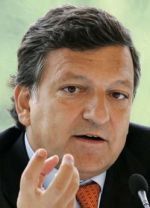Barroso heads to Sudan to press U.N. mission
Sept 29, 2006 (BRUSSELS) — European Commission President Jose Manuel Barroso and a top EU aid official will go to Sudan this weekend to try to convince Khartoum to allow U.N. peacekeepers into Darfur.
 Fighting between militias, government forces and rebel groups in Darfur has killed an estimated 200,000 people and displaced 2.5 million others since early 2003. A 7,000-strong African Union force has been unable to stop the violence.
Fighting between militias, government forces and rebel groups in Darfur has killed an estimated 200,000 people and displaced 2.5 million others since early 2003. A 7,000-strong African Union force has been unable to stop the violence.
The Sudanese government has repeatedly rebuffed a United Nations offer to send 22,000 U.N. peacekeepers to replace the AU force, whose mission has been extended until December 31, 2006.
Sudan’s Khartoum-based government has said the U.N. peacekeeping offer is motivated by Western colonial ambitions.
Barroso, who is president of the EU’s executive body, and EU Aid Commissioner Louis Michel are due to meet Sudan’s President Omar Hassan al-Bashir on Saturday evening in Khartoum, before travelling to Darfur on their two-day trip.
“We will try to show it is in his interest, as well as that of the international community, to allow a U.N. mission in Darfur,” an EU official said.
The official said Bashir was key to solving the deadlock but getting China and Arab countries on board was also crucial.
China, which has veto power on the U.N. Security Council, is a major investor in Sudan. Western diplomats hope Arab countries will use their leverage with Sudan to win support for the U.N.
If Khartoum persists in its objections to any U.N. force in Darfur, the EU is likely to broach options, including keeping the mission under an AU hat while adding a U.N. component, said Africa analyst Tom Cargill at think-tank Chatham House.
However he said there was little chance of convincing Khartoum on that either.
“They do not want an effective peace-keeping force on the ground, so the branding does not matter that much,” he said.
CONFRONTATION
U.S. Secretary of State Condoleezza Rice said on Wednesday that Sudan had to choose between “cooperation and confrontation” with the rest of the world and accept a U.N. force in Darfur.
But Britain’s outgoing U.N. Deputy Secretary-General Mark Malloch Brown told Britain’s The Independent newspaper on Friday that Britain and the U.S. should stop making threats because Khartoum knew they could not back them with action.
The EU’s Justice and Security Commissioner Franco Frattini said this week there was not much chance of setting up a U.N. military intervention against Sudan’s will anyway.
“China would veto it and therefore nothing would happen,” he told EU lawmakers. He said the message to Sudan should be rather that it would be completely isolated if it refused to cooperate.
A Sudanese diplomat in Brussels repeated Khartoum’s opposition to a U.N. mission in Darfur.
“You cannot impose peace by force, otherwise the U.N. would be there for a thousand years,” he told Reuters, adding that Khartoum would ask the EU to exert pressure on rebels who have not signed a peace deal reached in May.
Cargill said that the fact the EU had not followed Washington in calling the killings in Darfur a genocide may make Sudan’s President more comfortable about the meeting with the EU envoys, but he doubted it would yield any concrete results.
The European Union says it is the main contributor to the African Union’s mission in Darfur, with 242 million euros ($306.5 million) committed to the operation since 2004.
After visiting Sudan, the EU envoys will travel to Addis Ababa to meet the African Union’s commission.
(Reuters)
